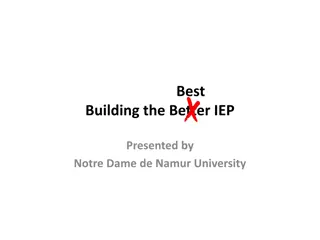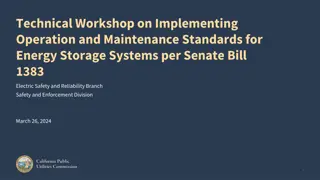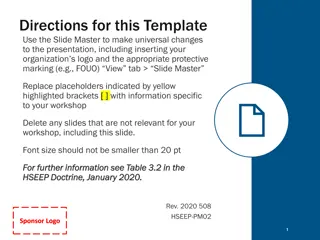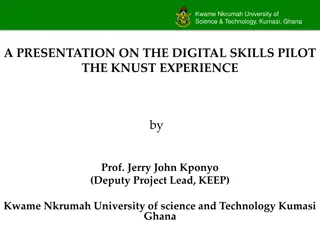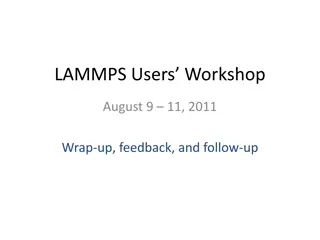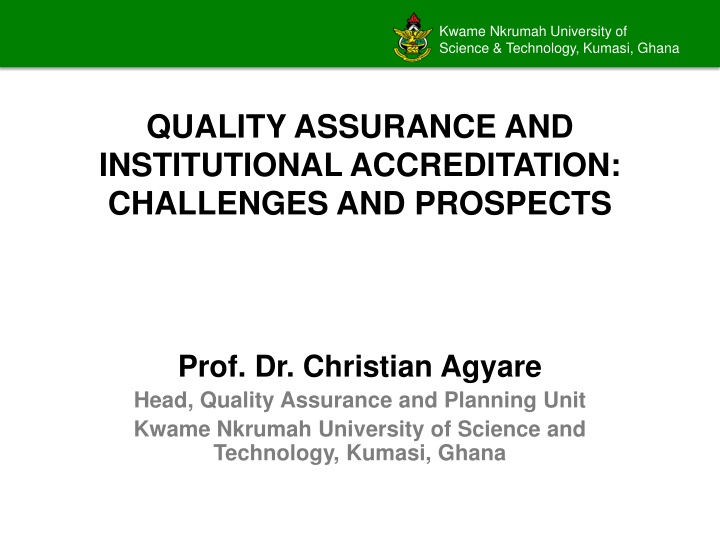
Challenges and Prospects of Quality Assurance in Higher Education
Explore the challenges and prospects of quality assurance and institutional accreditation in higher education as discussed at Kwame Nkrumah University of Science & Technology in Ghana. Learn about the importance of QA, KNUST's approach, problems faced, benefits of institutional evaluation, and recommendations for improvement.
Download Presentation

Please find below an Image/Link to download the presentation.
The content on the website is provided AS IS for your information and personal use only. It may not be sold, licensed, or shared on other websites without obtaining consent from the author. If you encounter any issues during the download, it is possible that the publisher has removed the file from their server.
You are allowed to download the files provided on this website for personal or commercial use, subject to the condition that they are used lawfully. All files are the property of their respective owners.
The content on the website is provided AS IS for your information and personal use only. It may not be sold, licensed, or shared on other websites without obtaining consent from the author.
E N D
Presentation Transcript
Kwame Nkrumah University of Science & Technology, Kumasi, Ghana QUALITY ASSURANCE AND INSTITUTIONAL ACCREDITATION: CHALLENGES AND PROSPECTS Prof. Dr. Christian Agyare Head, Quality Assurance and Planning Unit Kwame Nkrumah University of Science and Technology, Kumasi, Ghana
Introduction Presentation Outline Quality Assurance (QA) in Context KNUST Approach to QA KNUST Approach to Institutional Evaluation (AQRM) Problems and Challenges Benefits of Institutional Evaluation Recommendations www.knust.edu.gh www.knust.edu.gh www.knust.edu.gh
Quality Assurance in Context The need for QA for effectiveness is imperative The quest for excellence beyond prior standards has become a global phenomenon Oyewole (2012) indicates that, standards are needed due to: Efficiency and competitiveness www.knust.edu.gh www.knust.edu.gh www.knust.edu.gh
Quality Assurance in Context Increase mobility, globalization and cross-border recognition of qualifications Involvement of private interest in HE The challenge of mode of delivery An expansion in enrolment Market demands for quality and relevance of education www.knust.edu.gh www.knust.edu.gh www.knust.edu.gh
The KNUST Approach to QA QAPU is responsible for QA and strategic planning Three-stage approach is used: inputs, process and output Inputs: all activities to admit and recruit staff Measures to ensure quality students intake and quality staff www.knust.edu.gh www.knust.edu.gh www.knust.edu.gh
The KNUST Approach to QA Contd Process: internal and external process for continuous improvement Areas: teaching and learning, students affairs, research, governance, internationalization, accreditation, academic freedom, community engagement etc. www.knust.edu.gh www.knust.edu.gh www.knust.edu.gh
The KNUST Approach to QA Contd Output: evaluation to check expected outcome Examination audit, satisfaction survey, tracer studies, assessment of teaching, departmental ranking, assessment of HoDs etc. www.knust.edu.gh www.knust.edu.gh www.knust.edu.gh
The KNUST Approach to QA Contd Policies and guidelines are developed to guide these processes. All major stakeholders are involved in all the QA processes. Example: Accreditation process www.knust.edu.gh www.knust.edu.gh www.knust.edu.gh
KNUST Approach to Institutional Evaluation (AQRM) Commitment from top-management was very high A committee was set-up with the inclusion of Chairpersons of Quality Assurance Committees from all units/colleges www.knust.edu.gh www.knust.edu.gh www.knust.edu.gh
KNUST Approach to Institutional Evaluation (AQRM) Cont d The committee was maintained for similar activity like Self-evaluation (NAB) for consistency QA sub-committee are involved to build their capacity www.knust.edu.gh www.knust.edu.gh www.knust.edu.gh
Challenges with Institutional Accreditation Tedious nature of answering the questionnaire Difficulty in obtaining needed information from sub-units/departments/colleges www.knust.edu.gh www.knust.edu.gh www.knust.edu.gh
Benefits of Institutional Accreditation National and International recognition Identification of challenges and appropriate solutions found to fix them Serves as inputs for future planning for resources and infrastructure www.knust.edu.gh www.knust.edu.gh www.knust.edu.gh
Benefits of Institutional Accreditation cont d Assist in optimum utilization of institutional resources Helps to build capacity of staff involved in the QA process at the sub-units Ensures accountability to all stakeholders as a public institution www.knust.edu.gh www.knust.edu.gh www.knust.edu.gh
Recommendations Top management commitment is very key Team work is essential Adequate training and monitoring are needed from time to time www.knust.edu.gh www.knust.edu.gh www.knust.edu.gh
Recommendations contd The culture of quality assurance must be embraced by all stakeholders www.knust.edu.gh www.knust.edu.gh www.knust.edu.gh
THANK YOU www.knust.edu.gh www.knust.edu.gh www.knust.edu.gh


